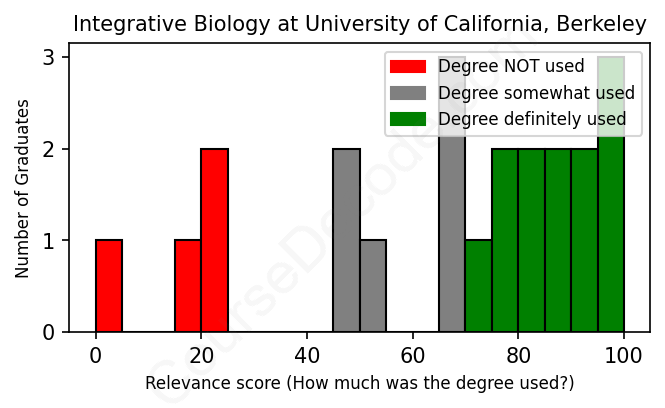
First, some facts. Of the Integrative Biology graduates from University of California, Berkeley we've analyzed , here's how many have used (or NOT used) their degree in their career:

These are estimates based on AI analysis of 22 LinkedIn profiles (see below).
The verdict? Slightly below average. Overall, with an average relevance score of 65%, Integrative Biology graduates from University of California, Berkeley have a slightly lower likelihood (-2%) of finding work in this field compared to the average graduate across all fields:
And for comparison, here's the chart for all profiles we've looked at across all degrees.
Also, after graduating, 45% of these graduates have pursued further education other than another Bachelor's degree (such as a Masters degree or other), compared to the average across all profiles of 35%. This suggests you may need more than just a Bachelors degree to be competitive as a Integrative Biology graduate.
See the details:
|
Relevance score: 91% We think this person has gone into a career highly relevant to their degree. We think this person has gone into a career highly relevant to their degree.
DEGREE INFOGraduated in 2013 from University of California, Berkeley with a Bachelor of Arts (B.A.) in Integrative Biology. No other secondary education since. JOB HISTORY SINCE GRADUATIONStudent intern Brodie Environmental Microbiology Group Jan 2013 - Dec 2013 Undergraduate Research Assistant  The Bentley Lab - Reproductive Neuroendocrinology May 2013 - May 2014 Postbaccalaureate Fellow (CRTA)  National Cancer Institute (NCI) Jan 2016 - May 2018 Ph.D. student  University of Virginia School of Medicine Jul 2018 - Present ABOUTNo information provided. |
The top 10 most common jobs done by the graduates we've analyzed (ranked most common to least) are:
After analyzing the LinkedIn profiles of UC Berkeley graduates with a degree in Integrative Biology, it seems that many have pursued careers in fields quite diverse from their academic background. Numerous graduates have taken roles in sales, marketing, and project management, like Custom Home Sales Manager or various marketing positions, which don’t utilize their biological knowledge at all. On the other hand, a good number of graduates have landed jobs directly related to healthcare and research—like Clinical Research Coordinators, Epidemiologists, and various roles in clinical settings—which make effective use of their Integrative Biology training.
Overall, the relevancy of jobs to Integrative Biology seems to vary greatly. While some graduates have indeed found their way into roles where their degree knowledge shines—particularly in healthcare and research—others appear to have drifted into unrelated areas that leverage different skills altogether, such as communication and project management. It’s a mixed bag, showing that while an Integrative Biology degree can open doors to science and health-related careers, it can also lead to a wide array of unrelated opportunities depending on individual career choices and interests.
Here is a visual representation of the most common words in job titles for Integrative Biology graduates (this is across all Integrative Biology graduates we've analyzed, not just those who went to University of California, Berkeley):

Based on the LinkedIn profiles of graduates from UC Berkeley's Integrative Biology program, it's clear that many students find themselves on a path that stays rooted in life sciences and healthcare. A lot of graduates land their first jobs in research or clinical roles soon after graduation. For example, many start off as research assistants, clinical coordinators, or in related support positions within medical environments. This shows a strong trend towards utilizing their biology education in practical settings, often involving patient care or public health initiatives. Even those who take on roles unrelated to biology, like marketing or design, tend to have career narratives that circle back to their scientific roots or involve skills that complement their biology backgrounds.
As time passes—about 5 to 10 years after graduation—these individuals typically advance into more specialized roles. Many progress to become epidemiologists, physicians, or educators, indicating a solid leverage of their biology education. Others move into healthcare management or research leadership positions, showing a blend of scientific knowledge with organizational skill sets. While there are a few who venture into unrelated fields, like marketing or creative industries, the majority appear to have productive careers that align well with the life sciences, demonstrating that the Integrative Biology degree from UC Berkeley can lead to meaningful and relevant career trajectories in healthcare, research, and beyond.
Honestly, a Bachelor’s degree in Integrative Biology at UC Berkeley can be pretty challenging. Berkeley is known for its rigorous academics, and the coursework in Integrative Biology dives deep into everything from genetics to ecology, which means you'll need to be ready for a lot of studying and lab work. The material can get complex, and you'll probably find yourself grappling with not just theories but also practical applications in a lab setting. It's definitely more demanding than an average degree, so if you're passionate about biology and ready to put in the effort, it can be really rewarding, but be prepared for a solid workload!
Most commonly, in the LinkedIn profiles we've looked at, it takes people 4 years to finish a Bachelor degree in Integrative Biology.
Looking at these Integrative Biology grads from UC Berkeley, it seems like some have landed pretty solid gigs while others are still finding their way. Those who went into healthcare and research are likely making decent money, especially the folks in specialized roles like epidemiologists and physicians, who generally earn well. On the flip side, some roles are in the education or non-profit sectors, which might not pay as handsomely, like teaching or program coordinating. Freelance and creative jobs can be hit or miss too, depending on the demand and personal hustle. Overall, it seems like a mixed bag—some are probably doing quite well financially, while others might be more on the struggle bus.
Here is a visual representation of the most common words seen in the "about" section of LinkedIn profiles who have a Bachelor degree in Integrative Biology (this is across all Integrative Biology graduates we've analyzed, not just those who went to University of California, Berkeley). This may or may not be useful:

Here are all colleges offering a Bachelor degree in Integrative Biology (ordered by the average relevance score of their Integrative Biology graduates, best to worst) where we have analyzed at least 10 of their graduates:
| College | Score | Count |
|---|---|---|
 University of Illinois at Urbana-Champaign University of Illinois at Urbana-Champaign
|
77 | 14 |
 University of California, Berkeley University of California, Berkeley
|
65 | 22 |